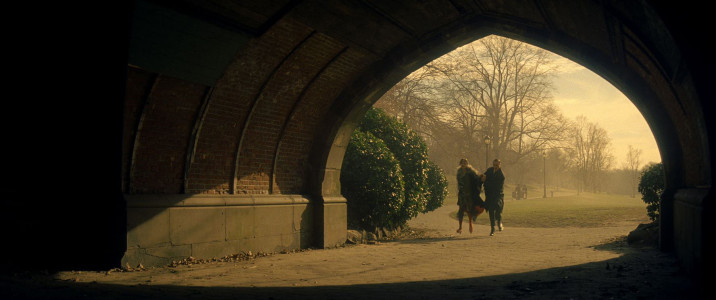I’m going to be frank for a moment and just admit that I find top ten lists to be eternally frustrating. It’s difficult compiling one for films I watch in a given year that were released in the past, and it’s nearly impossible to draft a list honoring what was released in the current year. I can’t see everything I would either like to see or have to watch due to limited release, financial means, and sometimes just bad luck. But as an annual tradition, I will go ahead and preemptively honor 2014 (in January of 2015) by listing ten films that I felt immensely satisfied with. At best, I absolutely loved these ten features and what they had to offer. Even the ones ranking lower on my list instilled a sensation, a thought, or an emotion that lingered long after I had finished watching them. Regardless of what I catch up on in the following weeks, I feel obligated to at least pay homage to these movies in the hopes that they either find a wider audience or are reinforced as truly great work. They’re simultaneously silly, somber, and scintillating. In a word, unforgettable.
10. Inherent Vice

I thought I had fully prepared myself. As soon as I heard Paul Thomas Anderson was adapting Thomas Pynchon’sInherent Vice to the screen, I read the book to understand why the auteur behind Magnolia and There Will Be Bloodwanted to film a farcical noir set in the dawn of the 1970s as much as I did purely to understand the plot itself. What I got was a byzantine and bonkers book, a parable that threw an assortment of characters, situations, and one-liners at me faster than a Zucker-Abrams-Zucker joint. So when I walked into the film, I expected a fairly light-hearted romp. Yet my expectations were once again confounded by a movie that, contrary to what the marketing would lead you to believe, is far sadder than it is whimsical. Yes, there are plenty of sight gags like Josh Brolin sensually sucking on a chocolate banana or a nuclear family conducting a heroin transaction, and there are plenty of spots of the film that made me laugh heartily. But what Inherent Vice the movie does successfully is adapt a tome by a mad raconteur and parses through the prose to pinpoint the melancholy and the tragic waste of potential the 1970s came to represent in American culture. This isn’t nostalgic so much as it is mournful, like a feature-length elaboration of Hunter S. Thompson’s words concerning the great wave that came to recede (indeed, that wave is embodied by the literal motif of water that courses throughout this film as well as Anderson’s previous entry The Master). The film feels positively authentic, perhaps not in an objective sense but in its complete execution, from costumes to set decoration right down to the shooting style and mise-en-scene. It feels like a lost 1970s classic that could have played on a double-bill with Robert Altman’s The Long Goodbye. I need to revisit Inherent Vice again, less to comprehend the mechanics of its plot but to bask in its atmosphere, its elegiac tone that transports you to a tangible vision of a very real moment in our history when we blew it, gave up hope of upending the status quo, and just tried our best to go forward. Much like Chinatown, arguably the greatest noir film ever made, Anderson’s film urges us to gaze toward the past as means of comprehending a troubled present.
9. The Immigrant
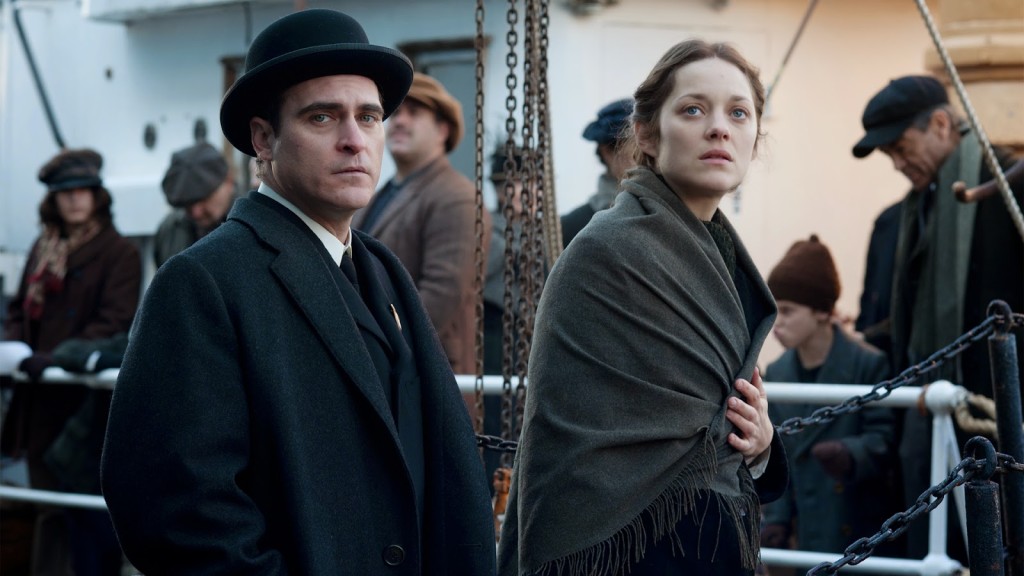
Speaking of the past, The Immigrant is a period piece that, much like Inherent Vice, strove to capture a particular moment in our culture. What made James Gray’s underrated gem such a pleasant surprise for me was its simultaneous use and undermining of melodramatic tropes to generate a compassionate and humane fable of equality and solidarity. While the three characters fulfill the archetypes established in Fellini’s La Strada, they feel like anything but cliches. Ewa is the innocent Polish immigrant who fights to reunite with her sister, but she has untapped reservoirs of strength that enable her to maintain face in the most grim and demeaning of situations. Bruno, the man who employs Ewa as a prostitute, is a manipulative antagonist, but he is as much a victim of discrimination and the hierarchical class structure within the budding community of New York City as Ewa is, and he yearns more for love than he does for hate. As for Orlando the Magician, he is a naive idealist whose brash confidence makes him a charming yet dangerous presence for anyone within his periphery. None of these characters are purely good or bad, and they are all looking for something resembling The American Dream, or at the very least happiness and a decent life. The Immigrant is exceptional in the way it portrays the quest these characters undertake, all intensely personal yet imbued with glimmers of humanity. All of this is presented in a fashion that harkens to the silent era of cinema through its gorgeous cinematography yet feels remarkably modern in its characterizations and expertly controlled performances. The ending may not come as a surprise for some, but it does give us one of the great closing shots in recent film, and perhaps one of the greatest of all time. That may sound like hyperbole, but that’s what makes The Immigrant a wonderful treat. It quietly sneaks up on you, draws you within its world, then leaves you with a breathtaking moment that reveals its greatness that, I certainly hope, will be rediscovered in years to come.
8. The Congress
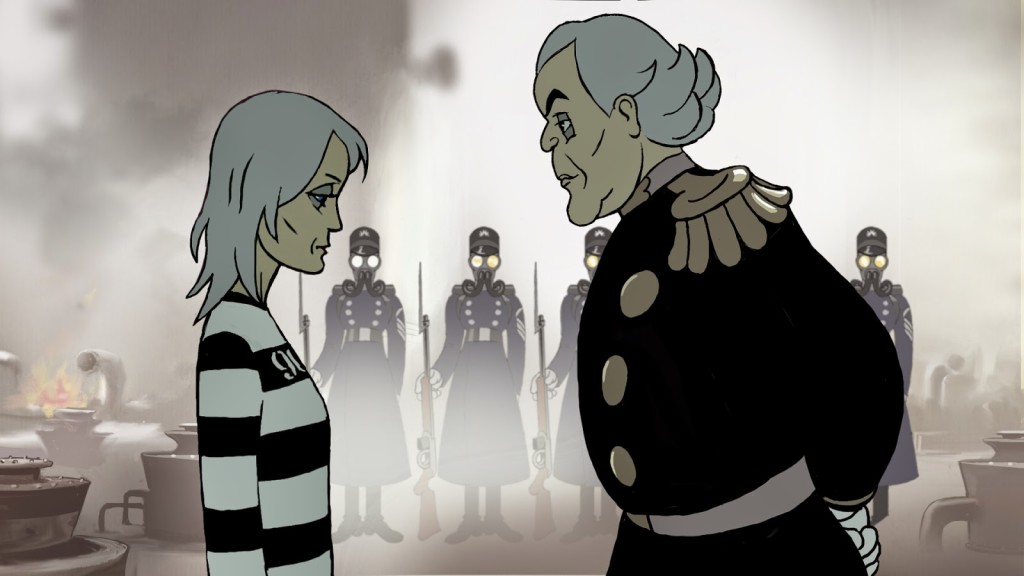
It has been an exceptional last few years for unorthodox science-fiction films, and Ari Folman’s The Congress ranks as one of the strangest to be released to theaters in quite some time. This loosely adapted take on Stanislaw Lem’sThe Futurological Congress divided and alienated audiences and critics alike, but I found it to be a stunning experience in spite of its flaws. Yes, the first forty minutes could have been condensed for time (Harvey Keitel could have lost one of his three monologues), but the rewards reaped from this dystopian satire of celebrity culture are plentiful both in the intellectual heft it carries as well as the truly psychedelic visuals. While Folman begins his film as a critique of Hollywood and the public’s incessant adulation of its stars, he branches off into more varied and thought-provoking thematic material once delving fully into animation. Our worship of the latest trends reflect a desperate yearning to attain youth, but it’s symptomatic of something grander, The Congress seems to argue. Our indulgence in forms of escapism (movies, television, hallucinogens) enable us to sustain the illusion that we are able to overcome our fallibility. Like Inherent Vice, this film is concerned with the allure of dulling the mind when the flaws in our world are so deeply embedded they seem irremovable. What Folman exhibits, other than a virtuoso aesthetic that seems tailored for a cult audience, is an empathetic acknowledgment of this appeal. When we feel powerless to better the lives of the ones we cherish most, who wouldn’t want to pretend that the rules of the physical universe don’t inhibit us and we can transcend our mortal bonds? That is what makes The Congress a powerful exemplar of science-fiction; through the prism of fantasy, our troubles are fully eradicated at the expense of our grasp of reality as well as the maintenance of civilization, but does the destruction of all we have built really matter when we have dulled ourselves into a vision of bliss? What an ambivalent and, yes, human quandary.
7. The Lego Movie
If you told me a year ago that I would find a spot for The Lego Movie on my top ten list, I would have called you either insane or ignorant. But the biggest surprise of 2014 was this blockbuster smash that achieved the unthinkable; bearing its badge as a corporate film while simultaneously lambasting corporate mentality. In other words, Chris Miller and Phil Lord, the brilliant satirists behind Clone High and the Jump Street movies, got away with murder. They have stuffed their film with enough comic invention and visual panache to entertain the youngest target demographic, but they court the older members of the audience not purely by mining nostalgia (though they certainly do that) but also injecting a knowing attitude towards the synonymous association between conformity and complacency. Furthermore, the dichotomy between order and chaos that is personified by Lord Business and the residents of Cloud Cuckoo Land, respectively, is transmuted in the film’s third-act twist as one between the old and the young. But it’s here where The Lego Movie reveals its full brilliance in refusing to vilify or glorify any particular side, but rather expressing a mature perception of their limitations. Everything in moderation can be beneficial to all, and everything, as well as everyone, has a purpose. It’s a humbling, thoughtful lesson for viewers of all ages, and an uncommonly intelligent message that is emblematic of the enduring fondness for the Lego brand. Both Miller and Lord were tasked with giving us a 100-minute commercial, and working within those parameters they delivered an exhilarating work of pop art that is more original, more meta-textual, and more poignant than it had any right to be.
6. Snowpiercer
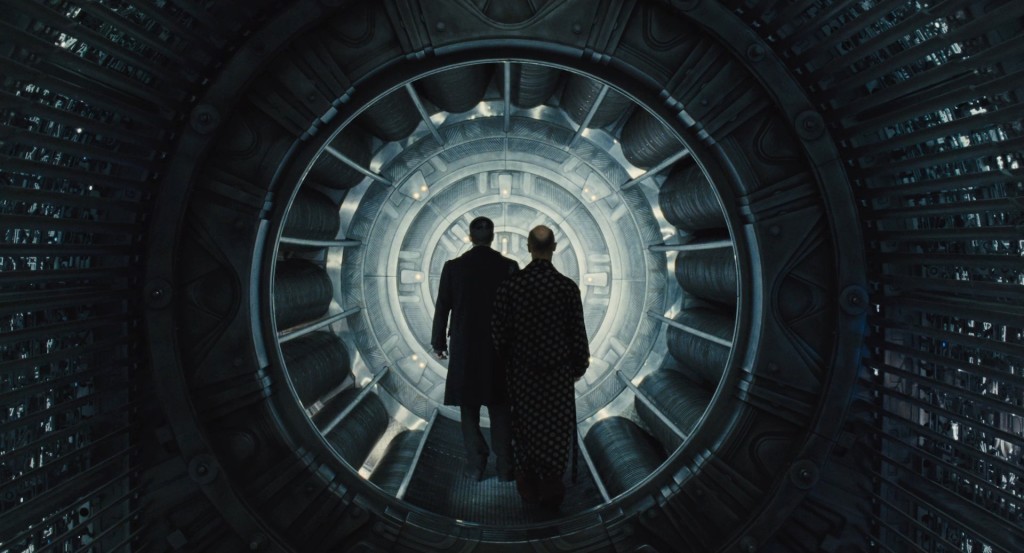
Stories can function on an allegorical level while narratives, particularly those of a cultural ilk, rely on familiarity and repetition. Every parable we tell ourselves through the ages is, in some way or another, inspired by what came before it and what will come long after. In several regards, this is exactly what Bong Joon-Ho’s Snowpiercer is about. Never mind if there are several questions regarding the logistics behind a train that is in perpetual motion for years; the film’s titular creation, one of the great trains of the movies, functions as a metaphor for social hierarchies. The very foundation of society is founded upon what we tell each other, what we dictate as “the rules” and who we revere for creating a sustainable model of living (for most of us, anyway). Furthermore, despite minute progressions, many of the struggles and strife of the commonwealth are repeated throughout history so long as an unjust ruling class maintains power. Bong’s film purposely evokes a trove of science-fiction films, from Brazil to Star Wars, but not for the self-important reasons of associating itself with classics of the genre. Rather, the deeply political agency of Snowpiercer, a film set years into a bleak future, is concerned greatly with the pervasive nature of the past. It haunts many of the characters aboard the train, particularly Curtis the tortured leader of the tail-end travelers who fight for control of the engine. The transgressions committed throughout mankind’s history don’t paint a promising picture for our present, and these aspects of our lesser natures persist in the most dire of circumstances. Beneath the veneer of a crowd-pleasing thriller, Snowpiercer is really a troubling statement on the arrogance of the human race as well as the preference for blind acquiescence as a means of acquiring a semblance of security at the expense of moral fortitude. We seem doomed to repeat the same mistakes again and again, argues Bong, until finally we don’t. Whether that ultimate outcome involves the end of our species or not he leaves for you to decide.
5. Mr. Turner
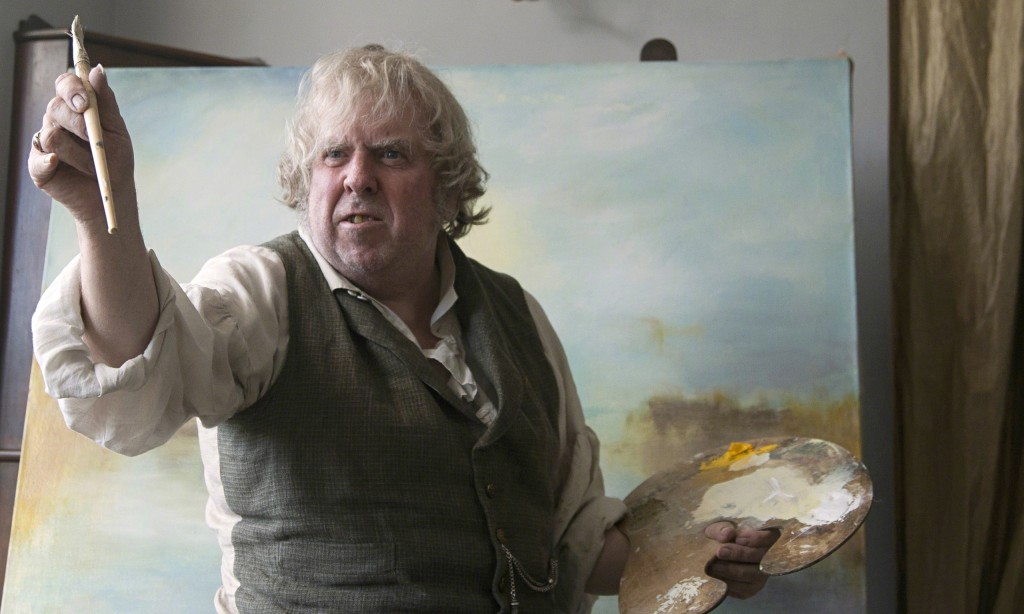
Art has been said to serve as an extension of the artist, an attestation to the legacy they impart upon the Earth. The truth of the matter is that a work of art can say as much, if not more, about its audience than it does the person who created it, and it is the relation between the individual and their body of work that drives the momentum of Mike Leigh’s fascinating Mr. Turner, a biopic that wisely studies its subject through an elliptical execution. By deliberately focusing on tangentially related events of the last twenty-five years of J.M.W. Turner’s life, Leigh attempts to proverbially paint a portrait of a man through his actions, his words, and his demeanor. His Turner, embodied brilliantly by Timothy Spall, is a flawed miscreant who neither demands nor necessarily deserves our sympathy. Nevertheless, he stands out amongst the proud elite as a strange frog of a man, well-spoken though inclined to offer a grunt or facial twitch as means of concise reply. He occasionally spits on his canvas when painting and draws both admiration and repulsion from his aristocratic audience. He displays both tenderness towards his beloved father and cold callousness towards his long-suffering housekeeper. Ultimately, Leigh’s Turner is neither a jester nor a monster, though it is natural to find him comical one moment, revile him the next, and soon after pity him. Mike Leigh’s body of work is typified by a surplus of generosity he displays towards the people he focuses on, and Mr. Turner is no exception. While working with a markedly more vibrant color palette thanks to the extraordinary work of cinematographer Dick Pope (who has unfortunately become the recent butt of a gaffe), Leigh never loses sight of the intimacy that is synonymous with his very best films. If Mr. Turner has something to say about the protean artist, as well as what can be described as the value of art, it’s that subjectivity remains malleable but the impact one has on others is absolute. Rather than extol the virtues of Turner himself, consider to whom Leigh gives the final shot of his masterpiece to. It is a sad, wise parting shot that acknowledges the ephemeral quality of human endeavors and the capacity for displaying compassion through art.
4. Whiplash

There’s initiative, and then there’s insanity, and the very careful distinction between the two is obliterated in Damien Chazelle’s Whiplash, an extraordinary and frightening deconstruction of the ideal of hard work and dedication yielding signs of genius. The film’s protagonist, Andrew, is committed to realizing his dream of becoming one of the great drummers while dispensing with frivolities like human interaction or relationships. When he preemptively breaks up with his girlfriend, he outlines a potential scenario that robs her of her own agency and makes him sound like a sociopath. Though he’s nothing compared to his teacher, the tyrannical Terence Fletcher. Fletcher is played by J.K. Simmons, that renowned veteran actor who’s always had memorable roles in a diverse filmography ranging from Burn After Reading to Spiderman, but he gets the role of a lifetime by playing one of the great movie monsters in recent memory. He’s a man who screams at his students, throws chairs at them, and manipulates them into lowering their emotional guard so he can sink his barbs deeper into their psyche. He makes Lermontov, the ruthless impresario from Powell and Pressburger’s The Red Shoes, look like a perfectly reasonable mentor. Like that great character, Fletcher believes wholesale in no half-measures when musical pursuits come into question, not if you claim to be serious about it, anyway. Andrew is indeed talented, and he has potential that is put to the test constantly until the dizzying climax, but it’s a testament to Chazelle’s direction and script that we remain unsure as to whether his sacrifice is ultimately a good thing. Whiplash utilizes American Jazz as a catalyst for the brutal relationship between two people who divorce themselves from their humanity. It is, in many ways, a horror film about an evil man who attempts to mold his protege into the ideal image that fits his warped ideology and that prodigy’s willingness to be shaped and adapt to whatever is thrown at him. There’s a moment near the end when the two share a glance that, in any other film, would be unabashedly triumphant. That it still is while bearing truly disturbing implications makes this one of the most excitingly original independent films in years.
3. The Tale of the Princess Kaguya
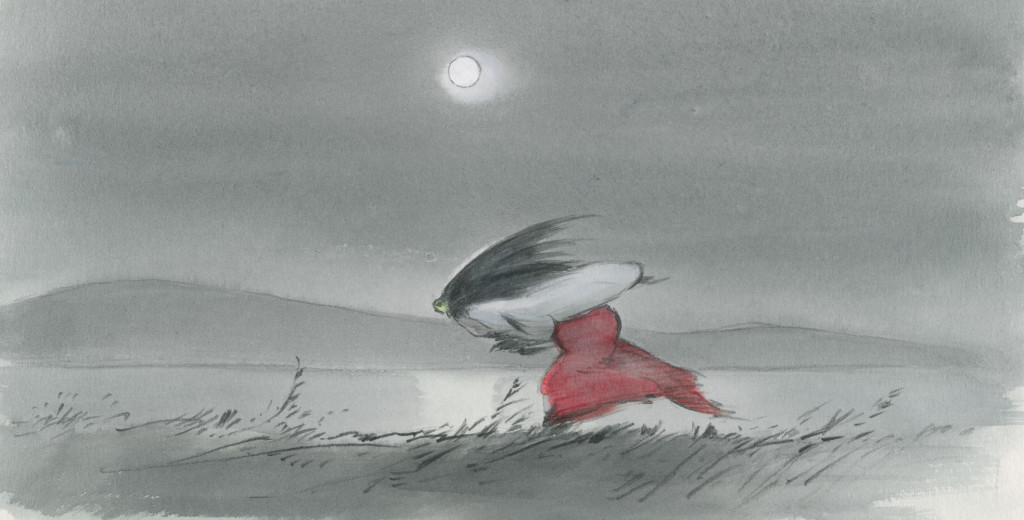
Some films are so effortlessly beautiful that it becomes perilously easy to overlook the amount of craftsmanship that is invested in the production of a motion picture, and Takahata Isao’s The Tale of the Princess Kaguya is easily one of the most stunning films I have ever seen. In an age where CGI has become the standard, Takahata’s retelling of one of Japan’s oldest folk tales opts for a defiantly hand-drawn aesthetic that is anything but sloppy. Takahata deliberately leaves white space within the frame in certain scenes, as if we’re witnessing an illustration in motion, yet he also fills the screen with unforgettable imagery including the titular princess angrily bursting through a nighttime vista in a monochromatic blur or a cloud formation turning into a gargantuan dragon in the midst of a storm at sea. All accomplished with brushstrokes, and they are indeed impressive feats. But what makes The Tale of the Princess Kaguya a truly remarkable film is the princess herself. She becomes subjugated to rigid constraints of class and gender and tries desperately to maintain her integrity and vivacity, only to be pushed to the point that she makes a terrible mistake. She pays the price for it, but the film does not chide her for what she has done. Rather, we spend nearly the entire film entwined within the emotional state of the young girl found in a bamboo stalk, from the unadulterated joy she feels dancing in a shower of cherry blossoms to immense sadness as she blackens her teeth when prompted to court potential suitors. In spite of its flights of fancy, The Tale of the Princess Kaguya is enamored with the natural world and quietly mournful of how little mankind appreciates all it has to offer until it is too late. Takahata has crafted a tour de force that is joyous, elegiac, and brimming with an avid love for life like few films, and it is an instant classic.
2. The Grand Budapest Hotel
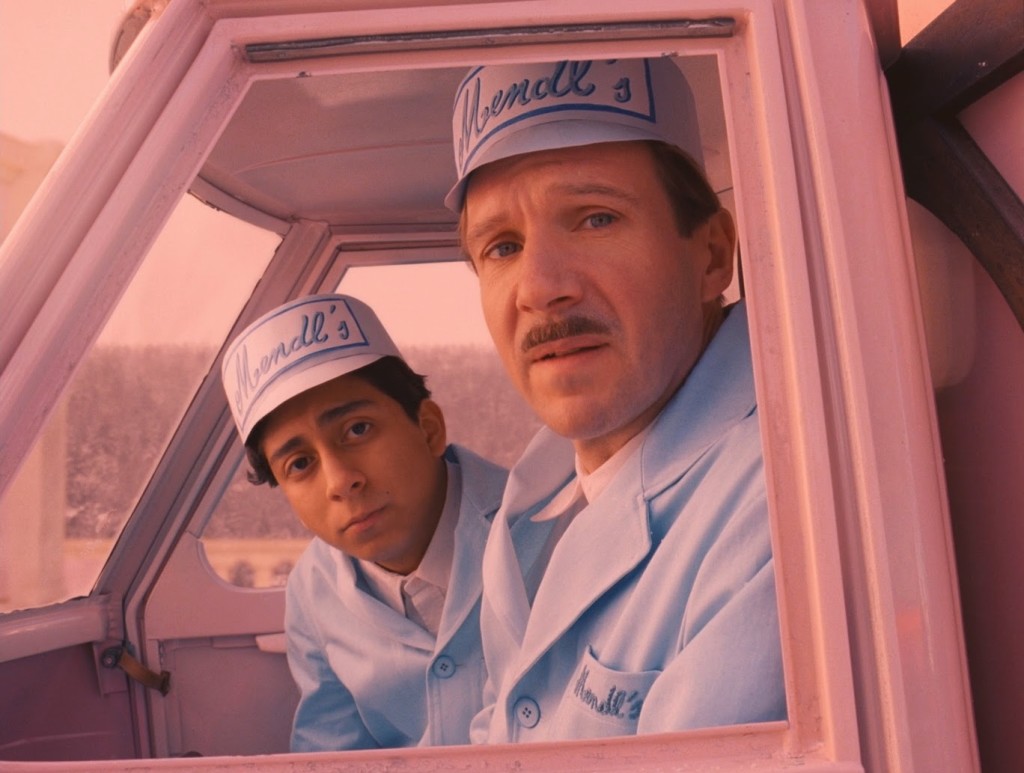
Though by no means the most violent year on record, 2014 seemed to embody a disconcerting prevalence of barbarism and bloodshed throughout the globe. By the time the clock struck midnight on January 1st, it wasn’t hard hoping that 2015 would be at least marginally less brutal than the year that came before. But to be realistic, mankind has always held a propensity for cruelty, and will doubtless continue to do so until its extinction. That’s why we are taken aback by acts of good will from our compatriots that is inspired not by ulterior motives but out of the ironclad conviction that the simplest expressions of kindness matter a great deal. That’s what makes M. Gustave one of the most fascinating characters of any film. He is alternately raucous and refined, foul and fastidious in equal measure. He treasures the fragrance of a specific French cologne and becomes flabbergasted when Zero, his confidant and apprentice, forgets to bring it to him in the aftermath of a prison break. But he has the grace to take accountability for his harsh words when he learns that Zero is a refugee and proffer his sincerest apologies. In other words, M. Gustave is a complicated man who, above all, strives to instill civility within his micro-universe but never forgets the people he works with and, ultimately, sacrifices himself for. Beneath the sumptuously mounted artifice of Wes Anderson’s The Grand Budapest Hotel lies a powerful belief in morality, not as a pretense meant to mask the essentially primitive nature of man but to emphasize our better selves. History is marred by violence and tragedy, even in the pastel-colored fantasia of Wes Anderson’s vision of the past, and evil will always linger in the hearts and minds of men. But love and goodness endure as well, and they always will even in the smallest of things like a box of cakes or a pin of a secret society of concierges and, of course, a bottle of French cologne.
1. Boyhood
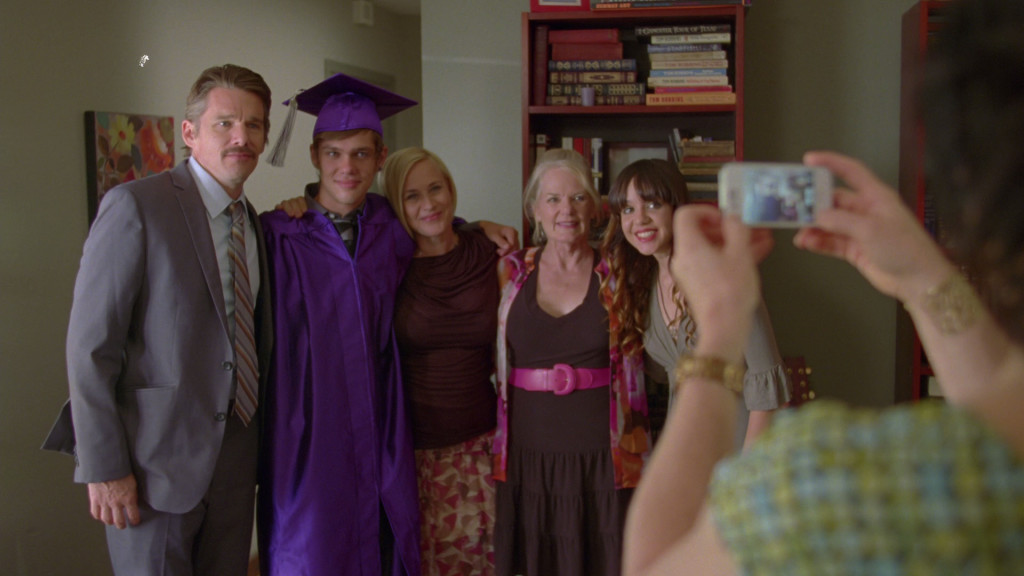
André Bazin, the famed film theorist and proponent of cinematic realism, once said that the primary function of photography, and by extension cinema, was to “embalm time”. In that case, Richard Linklater’s Boyhood is the realization of that philosophy. It fulfills one of the seemingly unattainable ideals of cinema, which is to capture that which is in flux. It is about not only the gradual growth and maturation of a boy into a young man but of his divorced parents, his sister, the world he lives in. It is a period piece made within the moment, a chronicle of a family that will seem very familiar to countless families yet cannot be called universal, because it’s virtually impossible for all of us to be given the same experience. Not when our social environment is determined by race, gender, class, and personal upbringing. But Boyhood doesn’t make the mistake of attempting to tell the story of everyone’s coming of age, and it’s all the better for that. It’s the story of a boy growing up in Texas in the dawn of the 21st Century between two presidencies, a burgeoning love of art, and a cognizance of the growing prominence of technology within his, and our, world. He graduates high school, goes to college, and that’s the end of the movie. Except what makes Boyhood so marvelous, so emotionally resonant, is the way it invites us into the lives of this family for nearly three hours. In observing the formation of Mason Jr.’s foundation as a person, as well as how his parents change over time, we remark upon what has led us to this current juncture in our lives. In doing so, I couldn’t help but look upon the audience I first saw the film with as I exited the theater and wondered what events in the course of their lives influenced who they were and who they might become. Fundamentally, Boyhood provides a template for understanding others as much as ourselves. I’ll quote another film critic, Roger Ebert, by saying that “the movies are like a machine that generates empathy.” Whether by Bazin’s or Ebert’s standards, Boyhood would be an unquestionable triumph. By my standards, it’s the best film of 2014.
